The families turning to pet food banks amid a staggering rise in costs
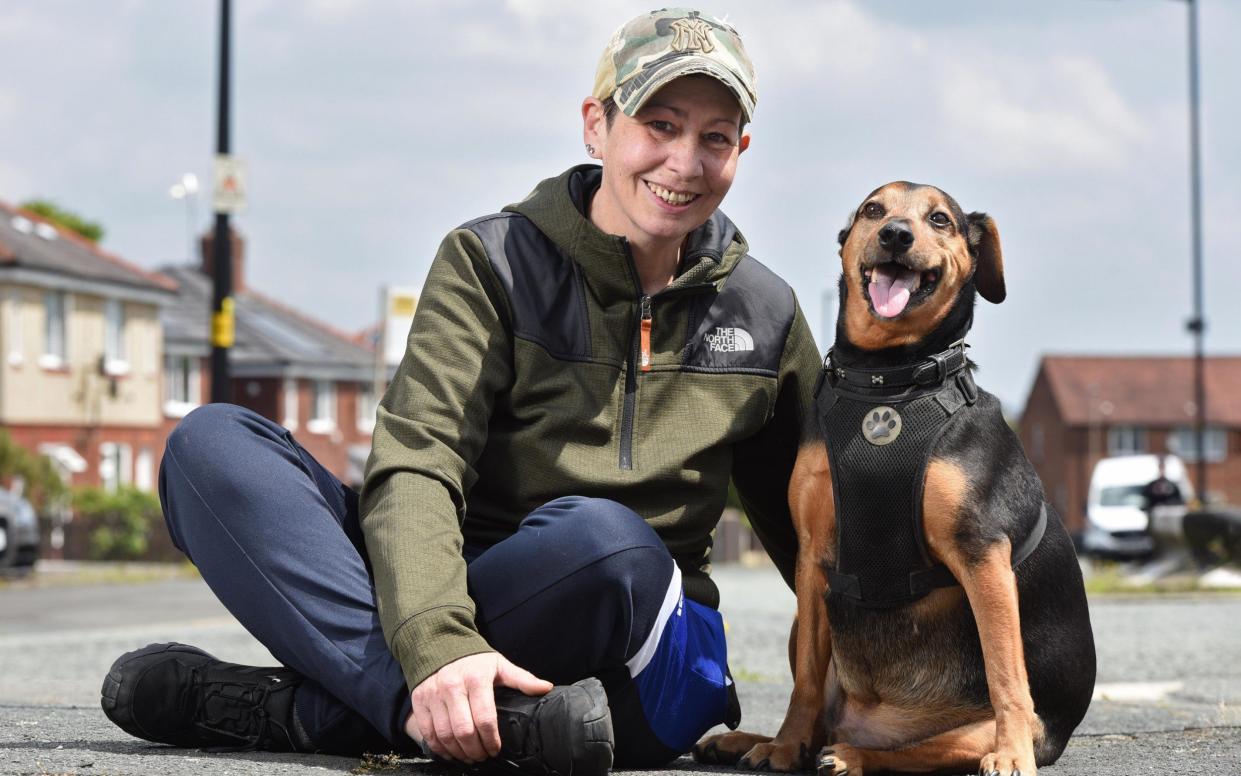
Britain has long been a country of dog lovers, but the pandemic turbocharged our canine obsession. Almost overnight, households became very lonely and bored, and one of the only ways to legally leave the house was to walk a dog.
So began the pandemic puppy boom. In March 2021, UK Pet Food (formerly the Pet Food Manufacturers Association) estimated 3.2m households had recently acquired a pet – and more than half of new owners were young, aged between 16 and 34.
Even then, the trade body warned that new pet owners were underestimating the cost of looking after an animal, while the RSPCA predicted a crisis once owners returned to work and could no longer spend entire days with their puppies.
By October that year, when the effects of the cost of living crisis were first starting to be felt, charities were reporting that pet owners were already trying to sell their dogs on Gumtree. Some were disguising them as strays so rescue centres would take them in. Many of these centres are now full.
‘I’ll feed my dogs before I feed myself’
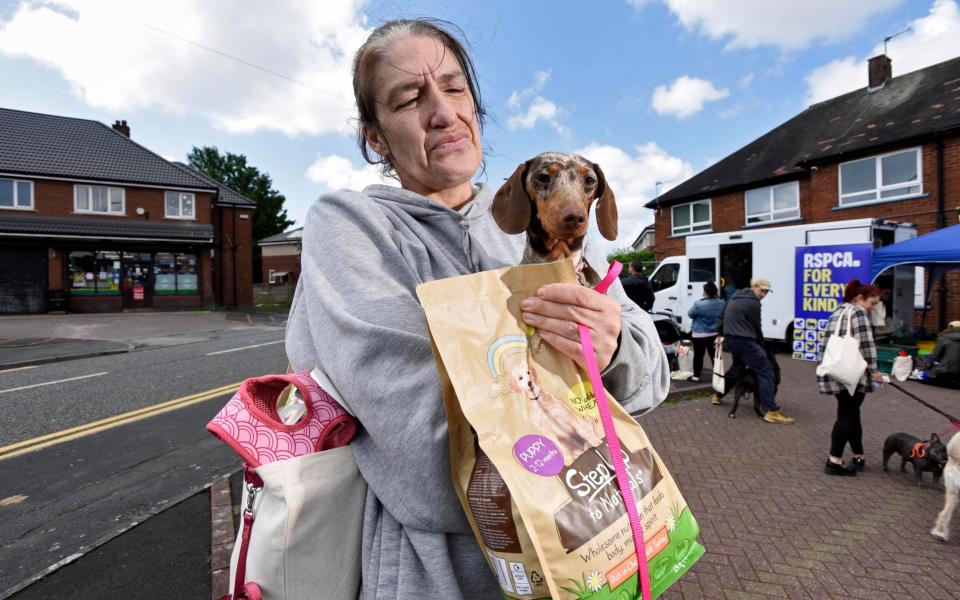
Outside a community centre in Wigan, a picture emerges of where Britain’s pandemic puppy boom has left us: dozens of pet owners queue up outside an RSPCA van, each waiting for a free checkup. Some will come away carrying bags of donated pet accessories and food, others with vouchers for vet treatments they could not afford otherwise.
“I’ve had to cut back on food for myself,” says Hayley Hurst, a full-time mother-of-three, who is here with one of her four dogs. “A visit to a consultant is £60, and the last vet bill for my Frenchie was £380.”
Even measured against other price rises typically lumped in with the cost of living crisis, the soaring cost of pet ownership has been stark. Some types of pet food rose in price by almost 58pc in the year to July 2023, according to The Grocer’s key value items tracker.
Dog food has increased in price by 37pc since February 2020, according to analysis by price comparison site Idealo.
Hurst has certainly noticed – her dogs consume two sacks of food a day, and she has had to rely on friends to secure cut-price food from friendly shops. “It’s been hard, but I won’t give them up,” she says. “I’d rather feed them before I’d feed myself.”
With rescue centres at breaking point, the RSPCA has been forced to take preventative measures to keep pets with their families. That means holding events like these, where pet owners can receive a free checkup and vouchers for treatment. Amid the pandemonium of dozens of dogs playfighting one another, owners are filling tote bags with accessories and toys.
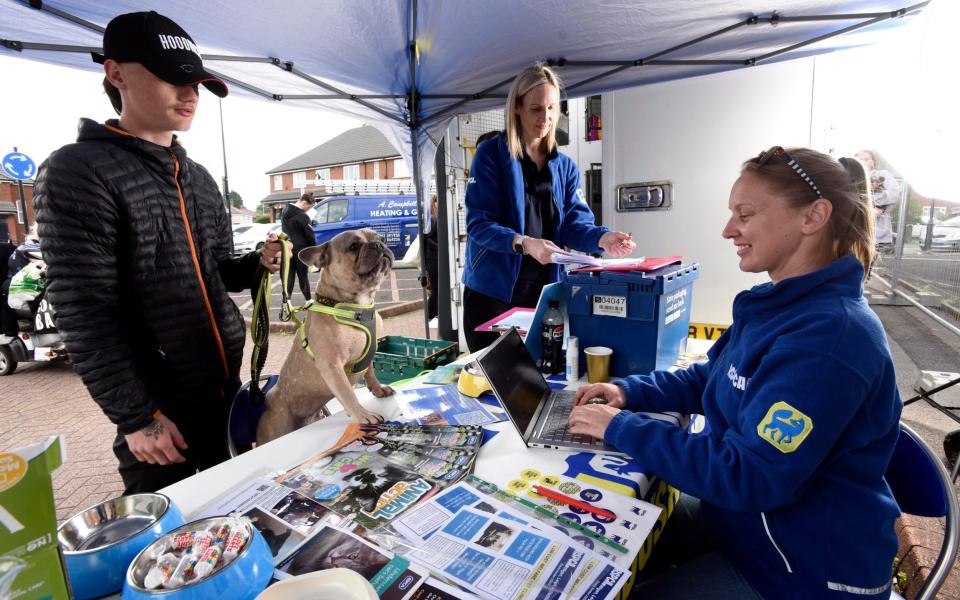
“It looks like I’m being greedy because I’ve got four bags,” laughs Hurst, who nervously glances behind her to check no one has taken anything from her haul. “But it’s hard being a pet owner. I’ve got depression and anxiety, and my dogs help me with that.”
Point of desperation
In the last two years, pet food banks have emerged to support owners struggling with the cost of feeding their animals. Jane Hamilton, a property developer and former vet, works with The Brick, a charity which started one such food bank 18 months ago in St George’s Church, down the road from today’s pop-up.
“People are allocated only a small amount because we can’t feed everyone’s pets,” she says. “I heard people had been going to food banks and asking for corned beef to feed their pets. This [a pet food bank] isn’t the solution – it’s a token gesture.”
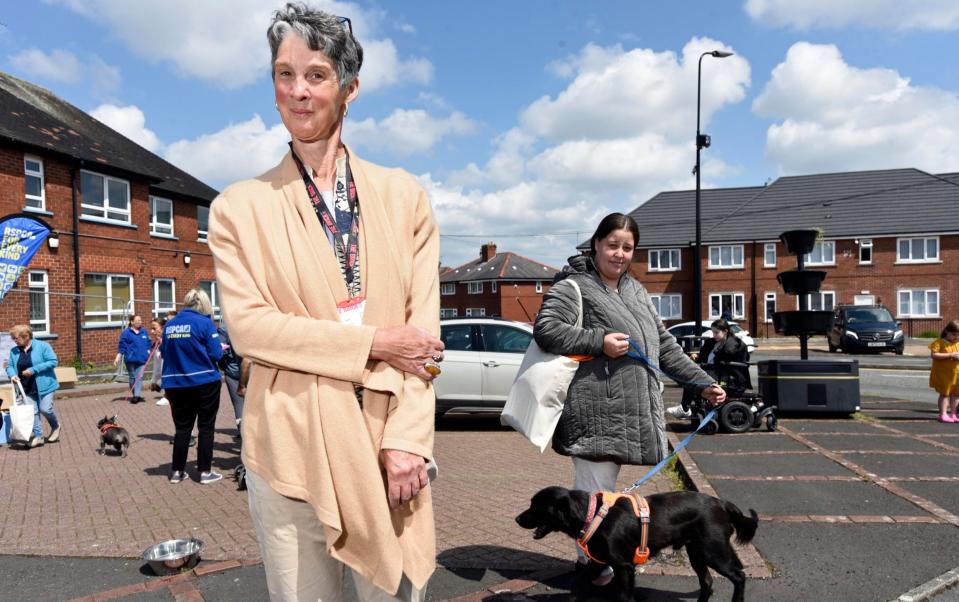
Hamilton, 40, has sympathy for pet owners, many of whom have been caught off-guard by surging rents, or have found landlords reluctant to let to a tenant with an animal.
“Some people are paying £100 a month more than a year ago – if you have a dog and you’re trying to rent, you’re going to struggle because you’ve got an animal,” she says. “I have seen people in tents with their dogs because they love their pet and have nowhere to go.”
In some cases, however, soaring costs have pushed pet owners to a point of desperation where they have abandoned animals entirely. The RSPCA said there had been a “staggering” rise in pet abandonments across Britain – and local papers are full of bleak accounts of malnourished pets left out in the cold.
In May, Manchester Evening News reported that a puppy named Bramble had been discovered tied to a fence in a secluded woodland area where no one would find her.
“I have worked with animals for 15 years and never in my life have I seen dogs being abandoned in the state they’re in now,” says Hamilton. “There’s no need for animals to be left like that, regardless of people’s economic situation.”
Indeed, many of those who embraced the pandemic puppy trend simply did not foresee how expensive having a dog would be, she adds. “Everyone wanted an animal in the pandemic, but because of the cost of living people are suddenly realising they cost money. But an animal is for life. It is not a commodity.”
The sudden demand for puppies also triggered a wave of cowboy breeders, who saw an opportunity for profit. “We have become a culture where we have a lot of people breeding dogs for money,” Hamilton says. “It became a financial incentive to breed dogs to sell.
“But now it’s not as easy for people to sell those puppies. At one point you might have been getting £1,000 for a puppy. Now you might get £100, or not be able to sell it at all.”
Soaring vet costs
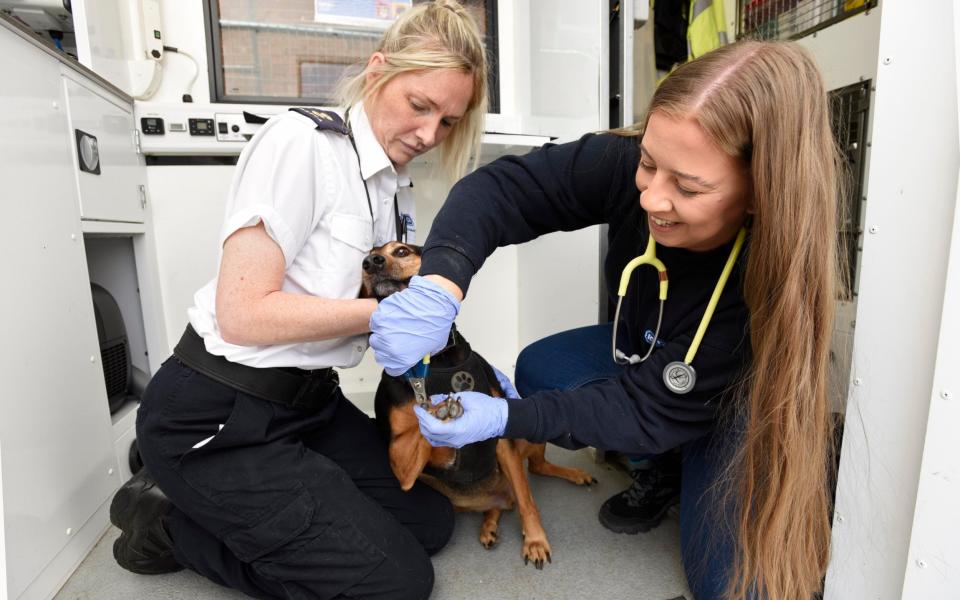
While food and toys have become more expensive, veterinary care remains the most pressing cost facing pet owners today.
Figures from the Office for National Statistics indicate that the inflation rate for veterinary services reached a peak of 13.1pc in May last year, compared to just 3.7pc in May 2021.
The sector has been plagued with staff shortages, exacerbated by Brexit and historically poor pay. According to the Royal College of Veterinary Surgeons, the number of qualified vets moving to Britain to work dropped by 68pc between 2019 and 2021.
Costs have reached such a level that Britain’s competition watchdog launched a review into the sector. Last September, the Competition and Markets Authority (CMA) announced it would consider the prices of care for small animals, such as dogs, cats and rabbits.
Alison Fletcher, national lead of the RSPCA’s pet food bank partnership, says vet bills are the cost most underestimated by new pet owners. The vet vouchers being handed out today are worth hundreds of pounds – but Fletcher says it’s worth it to keep pets with their owners, even if they might not have bought a pet were it not for the pandemic.
“Should we help people keep their pets if they can’t afford them? I say we absolutely should because that pet is probably the one thing keeping them going,” she says. “A lot of people got a pet because their wellbeing was so damaged by Covid. They shouldn’t have to get rid of their pet, because then they would spiral.”
Fletcher hopes that free checkups like the ones the charity offers will shield pet owners from shock bills. But even routine procedures like neutering can cost up to £500, which has been another factor in the ballooning number of unwanted pets filling up rescue centres.
Fletcher has been surprised by how well-used the pet food banks have been. “I have met people who have worked all their lives, and they’ve suddenly been made redundant and have to resort to a food bank for six to eight weeks – and at the end of that period they have got back on their feet,” she says.
“If we don’t support them when they’re spiralling are they realistically going to be able to go out looking for another job?”
‘I wouldn’t leave the house if it weren’t for my dog’
For some, pet ownership goes beyond a small boost to mental health. Toni Palfreyman, 50, is an army veteran, having served in Kuwait and Bosnia as a communications officer. “You know the ones in the war films with massive aerials on their backs? The ones who get shot first? I was one of those,” she says.
Palfreyman originally found her dog Alfie in a bin while she was living in Spain. He’s trained in pressure therapy. “If my anxiety gets bad he gives me lots of cuddles and keeps people away by circling me,” Palfreyman says. “I probably wouldn’t leave the house if it weren’t for him.”
Sadly, Alfie suffers from leishmaniasis, a parasitic disease caught from sandflies. “It’s like malaria for dogs,” Palfreyman explains. “I have to keep an eye on his liver and kidneys.”
Palfreyman was living in Spain when the pandemic struck, but recalls a very different lockdown to the one experienced in Britain. “The pandemic wiped out my savings,” she says. “In Spain we didn’t have furlough. We weren’t partying and having barbeques in the street like you English. It seemed to be like a three-month holiday for you guys.”
Three years ago, Palfreyman was forced to return to Britain because of Brexit, where she discovered that the cost of Alfie’s medication, which cost just three euros a month in Spain, cost £80 here. As a result, she only has one meal a day and cuts Alfie’s food with carbohydrates to make it last longer.
“I use the food banks as often as I can,” she says. “I’ve been doing that for about two and a half years. Just in the three years that I’ve been here the cost of food has nearly doubled. I’ve dropped Alfie to half a tin of meat with pasta and rice to bulk it out.”
For Fletcher, who is travelling to another pop-up tomorrow, Britain’s struggling pet owners are deserving of sympathy. “People need to think: it could happen to anybody. Huge companies are going bust and all kinds of people are suddenly finding themselves unable to pay their mortgage.”

